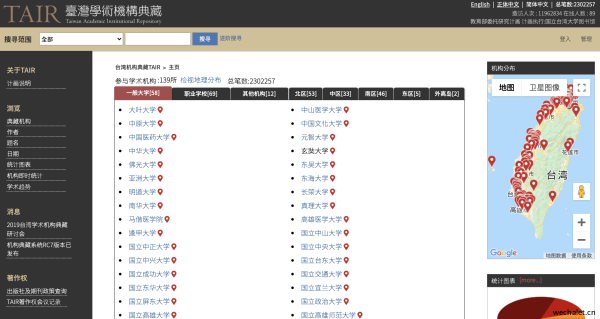Collection network of academic institutions in Taiwan
Country: China Type: education
Tag: academic research Institutional collection in Taiwan
Chinese Websites: http://tair.org.tw/?locale=zh-CN Enter The Website
In order to maximize the benefit of institutional collection, the principle of decentralized construction and centralized presentation is established: each school builds its own institutional collection to collect the academic research results of each school, so as to maintain the subjectivity of each school and show its own research characteristics and energy; In addition to their own systems, they also set up a common collection of institutions in Taiwan.

Taiwan Academic Institutional Repository (TAIR) is a Taiwan academic achievement portal website commissioned by the Ministry of education of the National Taiwan University Library, which is the common achievement of all academic institutions in Taiwan.
Term explanation: "institutional repository (IR) is a system in which an institution (University) saves its own research output, such as journal and conference papers, research reports, videos, teaching materials, etc., in a digital way, and establishes a network platform to provide full-text retrieval and use. Institutional collection can be thought of as a search engine with the research output of a specific institution as the main content. It is not to replace journal publishing, but to add a channel for research results to be used. "
In order to highlight the research results of the participating academic institutions, TAIR collects the metadata of the research results of the institutions, and users can easily integrate query or browse The overall research output of Taiwan can be linked back to the collection system of the original academic institutions through the bibliographic information website to obtain the full text of the academic achievements. Each participating institution can clearly display its own academic research achievements.
The TAIR development team will hold a management meeting through horizontal communication, and provide a number of system related reference manuals to help academic institutions improve the quality of bibliographic data. Users are welcome to provide suggestions on system development or system improvement as the driving force for the sustainable development of TAIR.
Related Suggestion
University of London (UCL)
UCL refers to the University College London of Lon...
Reading: 29 2024-11-17
University of Southern California
The University of Southern California (hereinafter...
Reading: 117 2024-11-16
Academia.edu - Share research
Academia.edu is an academic social networking site...
Reading: 33 2024-11-14




